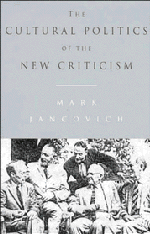Book contents
- Frontmatter
- Contents
- Preface
- List of abbreviations
- Part I The New Criticism and its critics
- 1 Contemporary responses to the New Criticism
- 2 The historical context of the New Criticism
- 3 Before the New Criticism
- Conclusion
- Part II The formation of the New Criticism
- Part III The establishment of the New Criticism
- Part IV The development of the New Criticism
- Conclusion: Modernism and postmodernism within the American academy
- Conclusion
- Notes
- Bibliography
- Index
2 - The historical context of the New Criticism
Published online by Cambridge University Press: 18 December 2009
- Frontmatter
- Contents
- Preface
- List of abbreviations
- Part I The New Criticism and its critics
- 1 Contemporary responses to the New Criticism
- 2 The historical context of the New Criticism
- 3 Before the New Criticism
- Conclusion
- Part II The formation of the New Criticism
- Part III The establishment of the New Criticism
- Part IV The development of the New Criticism
- Conclusion: Modernism and postmodernism within the American academy
- Conclusion
- Notes
- Bibliography
- Index
Summary
As has already been suggested, one of the problems with many of these theories is that they fail to locate the New Criticism historically, or else merely deduce its historical context from its theoretical positions. The little contextualization that is present is usually based on the work of John Fekete. In his book, The Critical Twilight, Fekete concentrates on the criticism of John Crowe Ransom, whom he identifies as the ‘Philosopher General of the New Criticism’, and as representative of the whole movement. Fekete does consider the New Criticism in relation to the Agrarian critique of industrial capitalism, but he argues that in the move from Agrarianism to the academy, the New Criticism was integrated into the ‘dominant order’ of American society:
Where Agrarianism seeks to present itself as socially and economically programmatic for an aesthetic life as a totality to which art as such is to be subordinated, the New Critical perspective… confines the broad scope of Agrarian ideology within the bounds of a literary criticism that champions art in safety from within the non-aesthetic life of the existing society. All possibilities of reshaping the exterior world are renounced to gain social sanction for the perfection of the interior world, the sensibility, through the strictly literary experience of life. We find, too, that the strong Agrarian critiques of industrialism are reduced to a critique of science, then to a critique of abused science, until, finally, peace is made altogether in the New Critical period, and the primacy of science is acknowledged.[…]
- Type
- Chapter
- Information
- The Cultural Politics of the New Criticism , pp. 11 - 20Publisher: Cambridge University PressPrint publication year: 1993



